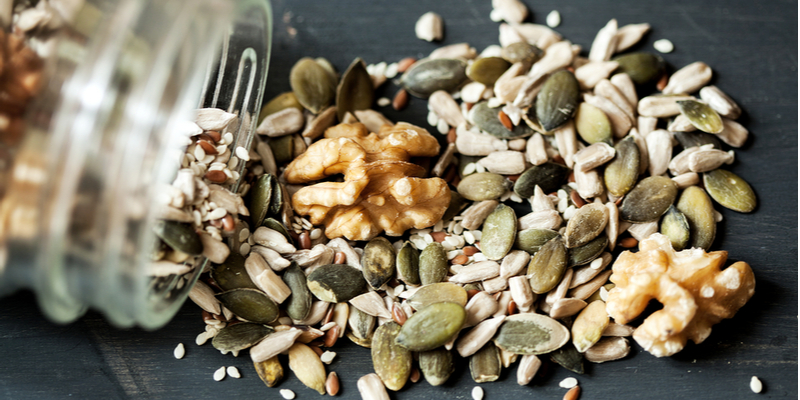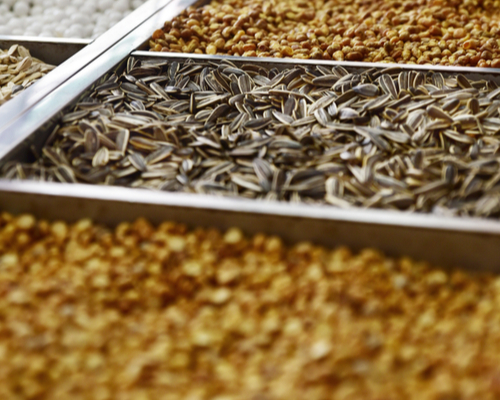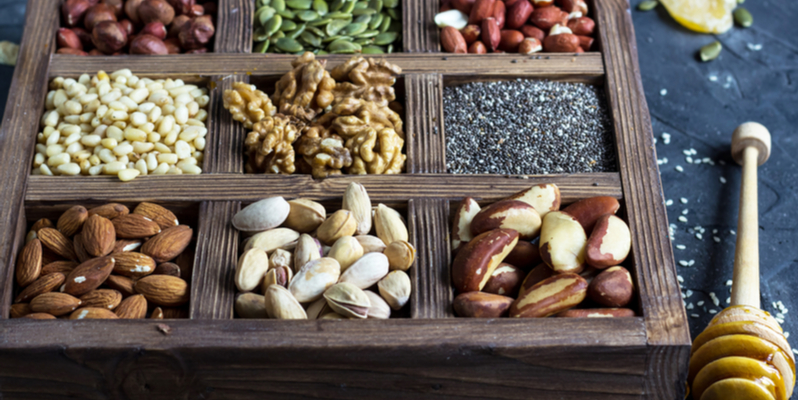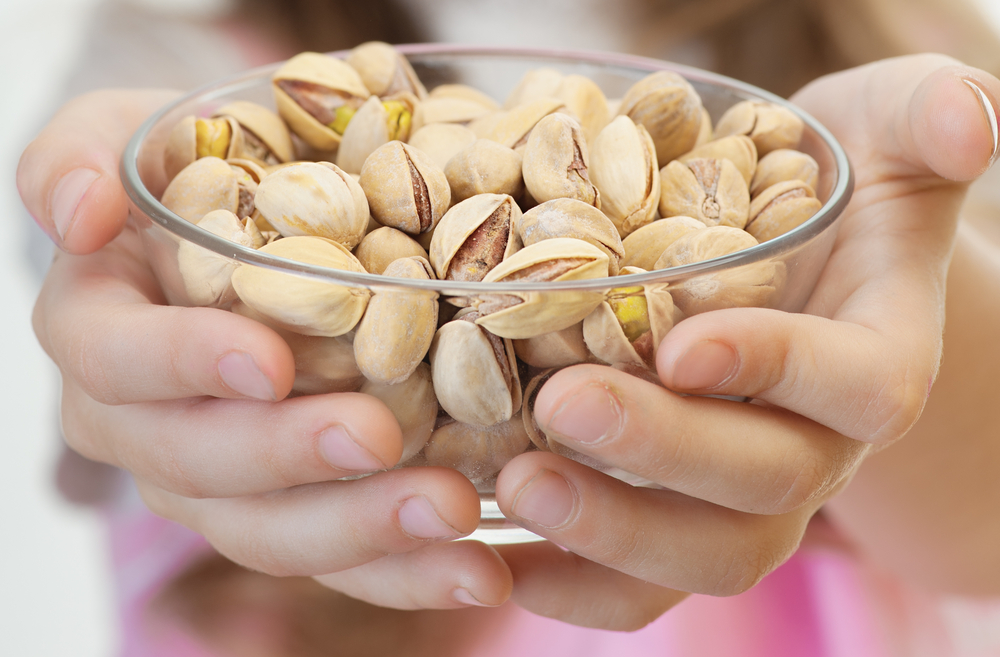Do you have to soak nuts and seeds before giving them to your children? The research suggests that soaking these food items is unnecessary. It is true that nuts contain phytic acid, or phytates, which can bind with minerals, making them unavailable to the body. But while soaking nuts in salted water may reduce phytic acid levels, the amount of phytates in nuts is too small to cause a mineral deficiency in either children or adults. There’s also no proof that phytic acid is bad for your health.
Phytic acid is an essential compound that protects nuts and seeds during their growth cycle, but according to some experts, including Nutritionist Lisa Richards, the compound can have counterproductive effects in the body. “When phytic acid binds to a mineral it will turn into phytates, which may prevent other nutrients from being adsorbed, including nutrients from the seeds or nuts themselves,” says Richards.
How does soaking nuts and seeds solve this problem? The theory goes that when you soak nuts and seeds, some of the phytic acid leaches out into the water. You pour the water off, and poof: you get nuts and seeds with a reduced level of phytates. Supposedly this means you will get more nutrients. “Soaking seeds and nuts can reduce the phytic acid content in them. By reducing this compound, the nutrients found in seeds and nuts, along with nutrients from other foods we consume, are more readily absorbed without being blocked,” says Richards, who adds, “Soaking may be especially important for children who do not have substantial amounts of gastric enzymes which can help aid the body in breaking down this compound.”

Phytic Acid’s Bad Rep
Phytic acid has a bad reputation. But not everyone agrees that the amount of this substance you find in nuts is problematic. “Nuts and seeds do contain phytic acid, which is considered an anti-nutrient that interferes with absorption of some minerals such as zinc, iron, and calcium. But while soaking can reduce phytic acid, it’s not necessary as it has never been proven that nuts and seeds cause micronutrient deficiency,” says Tina Marinaccio, a registered dietician nutritionist.
But if phytic acid is an anti-nutrient, and we have a way to remove it from foods, shouldn’t we do it anyway, even if the amount found in nuts isn’t harmful? After all, we don’t want to give our children dangerous substances. Right?
Not so fast. It seems that while phytic acid can block the absorption of minerals, it also does a lot of amazing things for the body. For one thing, phytic acid is an antioxidant and is also anti-inflammatory, reducing the risk for cancer. In particular, the substance is known to reduce the risk for colon cancer and other inflammatory bowel diseases. The “anti-nutrient” is also thought to have a beneficial effect on calcification, lowering the risk for developing kidney stones and osteoporosis. In addition to these benefits, phytic acid may lower blood sugar levels and may even lower cholesterol.

Soak Nuts And Seeds To Aid Digestion?
Some people say that whether or not you “activate” nuts and seeds by soaking them depends on the individual. Does your child have a hard time digesting nuts? Are you seeing pieces of undigested nuts in your child’s stool? This, say some, indicates that the phytic acid in the nuts is interfering with digestion: something that can be fixed by a good, long soak in salted water.
Nonsense (or should we say “Nuts?”), say other experts, including Dr. Rachel Brown of Otago Univerity’s Nut Research Group. Brown has been researching nuts for over a decade. When her research group looked at the effect of soaking on phytic acid levels, they saw very little difference in levels of phytic acid in nuts before and after soaking. The researchers, in fact, saw that while a bit of phytic acid came out in the soaking water, so too did some of the beneficial minerals in the nuts, canceling out the purpose of soaking these items in the first place.
Brown’s team also saw a very good reason not to soak nuts and seeds: the soaked items appeared to give the study subjects gas. (So much for soaked nuts and seeds being easier on the digestion!)

Are Lectins Toxic?
Phytic acid isn’t the only “culprit” we are told we must remove from nuts and seeds by soaking. Lectins are also named as a harmful substance lurking in the otherwise healthful nut. An unnamed nutritionist wrote to tell this author that “Nuts and seeds have ‘lectins,’ proteins that are from plant foods as a means of their self-defense from being eaten (since they can’t run, as animals do). These lectins are toxic to us, and hard to digest. If you don’t believe it, eat a handful of nuts before going to bed, and see how you sleep!”
But Tina Marinaccio says the lectin issue is a lot of hogwash. “Lectins have given nuts and seeds a bad rap thanks to a very popular diet book, where the author that vilifies lectins is happy to sell you a very expensive supplement that supposedly shields you from lectins. Lectins occur naturally in many plant foods, and there is no data to prove that they are detrimental to humans. We have huge inventories of data to show that plants are protective against disease.”
The bottom line is that nuts are good for you and for your children, the exception being those with nut allergies along with small children for whom nuts may pose a choking hazard. Nuts are nutrient dense, filled as they are with protein and healthy fats, along with important vitamins and minerals. If your child is not allergic to nuts, try using nut butter in smoothies or to spread on toast for a treat. For the older child, nuts make a good on-the-go snack anytime, with no soaking necessary.
Found what you just read useful? Why not consider sending a donation to our Kars4Kids youth and educational programs. Or help us just by sharing!
Reader Interactions
Comments
Trackbacks
-
[…] with soaking peanuts. However, this isn’t necessarily proven to be true, as discussed on Parenting.Kars4Kids.Org. Some people think you can get a better flavor from soaking peanuts, but that’s also open […]

I came across this article while researching soaking nuts and seeds. If all of this is true, then what is the remedy for those like me, who seem to have developed an intolerance? For the past couple of years, any significant quantity gives me symptoms of gas and bloating.
I would suggest trying them in a different form, for instance, as nut butter or Tahini, or eating a smaller quantity of these items.
So, why are there thousands of articles, blog posts, and books whose authors badger us to soak nuts, seeds, beans, and grains? Most of them are just passing-along this true-according-to-them information, and aren’t selling us supplements or anything else. What’s their motivation? Is it all just about the clicks these days??!! Thank you.
Maybe these so-called experts believe the real experts don’t know as much as they claim. Or maybe, as you suggest, it’s all about the clicks, and building a following. I know lots of people who swear by soaking, in spite of evidence to the contrary. I don’t even try to convince them. They think they’re right. I’d rather listen to what the science says.
What about if your child has an iron deficiency?
Phytates (phytic acid) in whole grains, seeds, legumes, some nuts—can decrease the absorption of iron, zinc, magnesium, and calcium. That comes from Harvard Health. I can find a hundred more articles saying the same thing. It is science based and factual. I’m guessing you must work for a nut company……
I do not work for a nut company. I am a researcher, writer, and parenting expert.
You would have to eat a very large amount of nuts for them to inhibit absorption of nutrients. I notice you don’t offer the link to the Harvard Health source.
Here is the article I think Elvis was talking about.
https://www.hsph.harvard.edu/nutritionsource/anti-nutrients/
Thank you for this article. I did look up that if you eat nuts as a snack, and not with a meal, it will not absorb those particular nutrients. What are your thoughts on sprouting seeds, grains, and legumes?
The process of sprouting seeds, grains, and legumes apparently alters much of their starch so as to increase the amounts of absorbable vitamins and minerals available in these foods. Sprouting, similar to the practice of soaking nuts, also breaks down phytate which can interfere with nutrient absorption.
Here’s another interesting article.
https://peanut-institute.com/nutrition-research/in-depth-discussions/lectins-in-peanuts-and-other-foods/#:~:text=As%20shown%20in%20the%20table,of%20the%20lectins%20were%20destroyed.
I started to soak my nuts with salt for 8 hours, and then cook them in the oven at 170 degrees for 8 hours. But after reading the one article on research with adding salt, I think I will omit the salt, and just boil instead and bake them.
You baked them for 8 hours??? That has to be a typo. Right?
No.
Interesting. I would think they’d be really unpleasant to eat after that.
Not at all. The consistency is lighter in both taste and crunch.
Very interesting! I may just try that. Thank you.